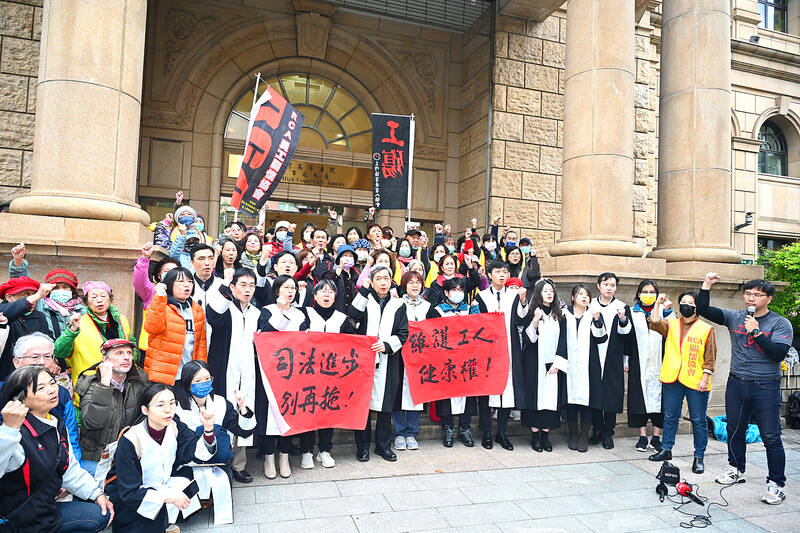The High Court on Wednesday ruled that the Radio Corporation of America (RCA) and three other companies must pay NT$170 million (US$5.16 million) to former workers and family members affected by cancer-causing chemicals used at its factory in Taoyuan from 1970 to 1992.
The second-instance judgement by the High Court in the case involving 222 plaintiffs seeking health-related damages represents the latest development in a series of complex legal battles that have been fought over the past two decades.

Photo: Wang Yi-sung, Taipei Times
“Although the amount of [compensation] in today’s verdict is not high, the ruling is still a step in the right direction,” RCA Employee Care Association chairperson Tu Chin-chu (杜津珠) said.
“At the same time, [the verdict] also tells business owners that they should take into account employees’ physical and mental health when pursuing profits,” Tu said. “We also hope that Taiwanese companies will learn a lesson from the RCA case and treat the younger generation of workers well.”
The plaintiff’s legal team also issued a press release after the ruling, saying that the compensation amount was lower than what the workers deserved.
Noting that the affected former RCA workers would find the compensation amount “hard to accept,” the lawyers said they would discuss with them whether to appeal the decision.
In a statement on Wednesday, the High Court said its judgement took into account scientific findings from overseas agencies, including the US-based Health Effects Institute.
The court found the plaintiffs were exposed to levels of harmful substances that exceeded legally acceptable levels.
RCA, a US electronics company, operated three factories in Taiwan from 1970 to 1992, employing about 80,000 workers at its peak.
In 1986, RCA was taken over by US conglomerate General Electric, which sold its factory in what was then Taoyuan County in 1988 to Thomson Consumer Electronics, the US subsidiary of French company Technicolor Group SA.
Three years after the acquisition, Thomson Consumer Electronics discovered pollutants at the Taoyuan plant and closed it the following year.
In 1998, a group of workers formed a self-help association to seek compensation through legal channels, resulting in multiple lawsuits involving nearly 2,000 plaintiffs beginning in 2004.
RCA was later found liable for illnesses, including cancer, contracted by employees due to exposure to harmful chemicals, such as the carcinogen trichloroethylene.
It was also found to have dumped toxic waste close to its factory, contaminating soil and groundwater.
In 2020, the High Court ruled in a civil suit against RCA, its parent company and successor entities that 24 out of 246 plaintiffs in one case be awarded NT$54.7 million, while rejecting the claims of the remaining 222.
Following appeals, the Supreme Court ruled in 2022 that the case involving the 222 plaintiffs be returned to the High Court for a second trial, whose decision was released on Wednesday.
The decision can be appealed.

Alain Robert, known as the "French Spider-Man," praised Alex Honnold as exceptionally well-prepared after the US climber completed a free solo ascent of Taipei 101 yesterday. Robert said Honnold's ascent of the 508m-tall skyscraper in just more than one-and-a-half hours without using safety ropes or equipment was a remarkable achievement. "This is my life," he said in an interview conducted in French, adding that he liked the feeling of being "on the edge of danger." The 63-year-old Frenchman climbed Taipei 101 using ropes in December 2004, taking about four hours to reach the top. On a one-to-10 scale of difficulty, Robert said Taipei 101

A preclearance service to facilitate entry for people traveling to select airports in Japan would be available from Thursday next week to Feb. 25 at Taiwan Taoyuan International Airport, Taoyuan International Airport Corp (TIAC) said on Tuesday. The service was first made available to Taiwanese travelers throughout the winter vacation of 2024 and during the Lunar New Year holiday. In addition to flights to the Japanese cities of Hakodate, Asahikawa, Akita, Sendai, Niigata, Okayama, Takamatsu, Kumamoto and Kagoshima, the service would be available to travelers to Kobe and Oita. The service can be accessed by passengers of 15 flight routes operated by

Taiwanese and US defense groups are collaborating to introduce deployable, semi-autonomous manufacturing systems for drones and components in a boost to the nation’s supply chain resilience. Taiwan’s G-Tech Optroelectronics Corp subsidiary GTOC and the US’ Aerkomm Inc on Friday announced an agreement with fellow US-based Firestorm Lab to adopt the latter’s xCell, a technology featuring 3D printers fitted in 6.1m container units. The systems enable aerial platforms and parts to be produced in high volumes from dispersed nodes capable of rapid redeployment, to minimize the risk of enemy strikes and to meet field requirements, they said. Firestorm chief technology officer Ian Muceus said

MORE FALL: An investigation into one of Xi’s key cronies, part of a broader ‘anti-corruption’ drive, indicates that he might have a deep distrust in the military, an expert said China’s latest military purge underscores systemic risks in its shift from collective leadership to sole rule under Chinese President Xi Jinping (習近平), and could disrupt its chain of command and military capabilities, a national security official said yesterday. If decisionmaking within the Chinese Communist Party has become “irrational” under one-man rule, the Taiwan Strait and the regional situation must be approached with extreme caution, given unforeseen risks, they added. The anonymous official made the remarks as China’s Central Military Commission Vice Chairman Zhang Youxia (張又俠) and Joint Staff Department Chief of Staff Liu Zhenli (劉振立) were reportedly being investigated for suspected “serious